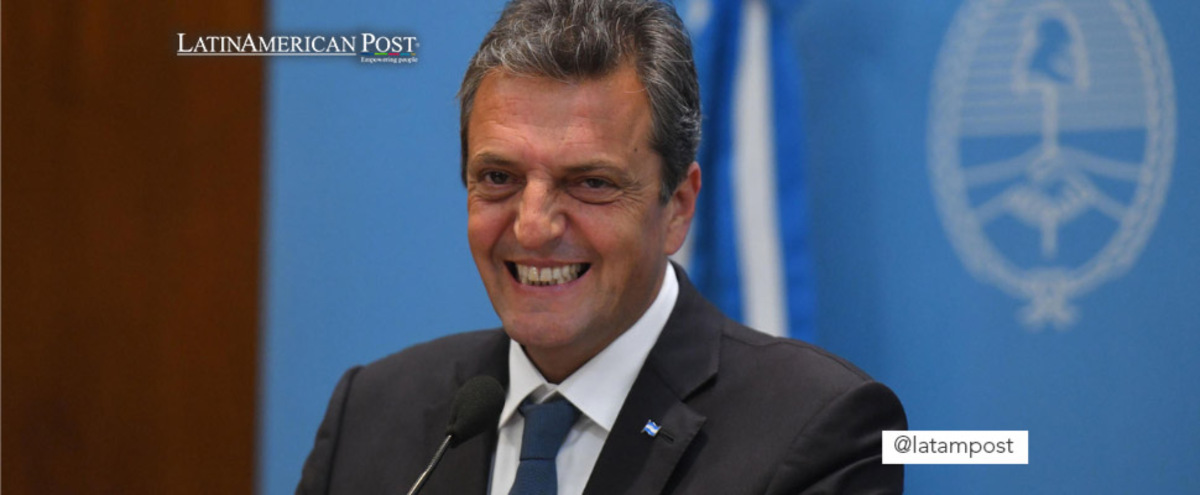In a political twist that defied expectations, Sergio Massa secured a substantial lead in the first round of the Argentine presidential elections, marking a remarkable comeback in the face of adversity. His strategic prowess and a nuanced understanding of the nation's complex political landscape played a pivotal role in this stunning electoral upset.

Photo: EFE/ Enrique García Medina
The Latin American Post Staff
Escucha este artículo
Leer en español: El notable regreso de Sergio Massa en las elecciones presidenciales de Argentina
In a political turnaround that defied all odds, Sergio Massa emerged victorious in the first round of the Argentine presidential elections, securing a lead of nearly seven points over Javier Milei, the surprise candidate of the August primaries. Massa's incredible success can be attributed to several critical factors, including his adept navigation of the complex political landscape in Argentina.
Massa's Strategic Maneuvers: Navigating Argentina's Political Landscape
One of Massa's crucial achievements was consolidating the Peronist vote, a political force created almost eight decades ago by General Juan Domingo Perón. Massa's political flexibility allowed him to distance himself from the Kirchnerismo movement at the most opportune moment for his electoral interests. In contrast, Javier Milei's party, La Libertad Avanza, lacked sufficient representation in the Argentine Congress to implement a meaningful electoral program.
Massa successfully halted the departure of Peronist votes in the conurbation of Buenos Aires province, where Milei had gathered five million votes in the primaries. Massa enlisted the support of Peronist governors, the same leaders who had thwarted Cristina Fernández de Kirchner's attempt to impose the less charismatic Eduardo 'Wado' de Pedro as her presidential candidate.
Javier Milei lost the disruptive rhetorical fervor that initially garnered him widespread support from frustrated segments of Argentine society. Instead, he adopted an ultraright political stance that alienated a significant portion of his original base. Milei's radical libertarian proposals generated fear among many voters.
Bullrich's Inconsistency and its Impact
The inconsistency of Patricia Bullrich, the candidate from Juntos por el Cambio (center-right), and her disregard for her internal rival, Horacio Rodríguez Larreta, co-founder of Pro (Propuesta Republicana), whose voter base had theoretical proximity to Sergio Massa's party, further contributed to Massa's success. The current Mayor of Buenos Aires and the Minister of Economy share a friendship, fueling speculation about possible collaboration in a "national unity government" advocated by Massa.
Massa orchestrated a broad range of social measures targeted at retirees, self-employed workers, and the most economically vulnerable families in the weeks leading up to the elections. These policies were enacted from his influential position as Minister of Economy, as President Alberto Fernández had delegated him substantial political and economic authority. Critics from the opposition accused Massa of playing the dual roles of minister by day and candidate by night.
Also read: Second Debate: This Is The Panorama Of The Elections in Argentina Two Weeks Before
It is essential to note that in the PASO (open primary elections), citizens choose party candidates rather than directly electing individuals for specific political offices. Although this wasn't the case for La Libertad Avanza, many voters hesitated before handing Javier Milei the presidential torch, emphasizing the importance of trust in known political figures.
Argentine voters grappled with the fear of uncertainty against a turbulent economic and social landscape dominated by emotional and political dynamics. This prompted them to place their faith in familiar political options, resulting in Massa's remarkable victory.
Massa's Triumph and Political Acumen
Sergio Massa's triumph in the presidential elections showcases his political insight and ability to adapt to shifting tides in the Argentine political landscape. By skillfully harnessing the Peronist vote, neutralizing his opponents, and implementing a comprehensive social plan, Massa emerged as a beacon of stability in a time of great uncertainty, resonating with voters apprehensive about embracing the unknown. His journey from adversity to success may serve as a testament to the enduring power of adaptability and astute political maneuvering in the ever-evolving realm of Argentine politics.





